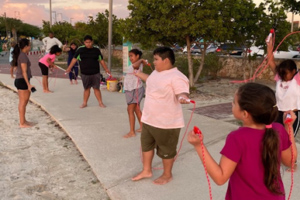By Melissa Stamper
Caribisch Netwerk
ORANJESTAD – How do you tackle obesity and overweight? It would help if the Aruban government invests in the pilot program against overweight and obesity ‘Jump 18’, says pediatrician Jamiu Busari. “The problem is more complicated than just unhealthy eating habits.”
Busari has been working at the hospital in Aruba for two years. This doctor also noticed that almost all children who came to a consultation with health problems were overweight or obese. Behind the Jump 18 project is a multidisciplinary team, which also consists of Aruban professionals. They give programs about nutrition and exercise, and they also conduct scientific research. For example, they look at how healthy the canteens of the schools in Aruba are. Among the children who participate in the program, the experts look at the blood values and physical changes.
Local approach is important
Busari took the initiative last year to start a prevention program. Together with Aruban professionals, he tries to tackle childhood obesity. “You cannot solve the obesity problem with just a weight loss program. The problem is more complicated than just unhealthy eating habits or me it is very important to use the Aruban strength and knowledge”, he says. There are several reasons why many people in Aruba are overweight. According to the experts, it has to do with upbringing and cultural patterns, but social and economic factors also play a major role.
Obesity: a culture problem?
“If you drive around the island you will see a lot of fast food chains thanks to tourism, but locals also eat there. You see large traffic jams on Friday evening at Wendy’s, that too falls under the culture patterns. These are all issues that make it difficult for a parent to change,” says Busari.
Last week a column was published in the Volkskrant that led to a lot of criticism among Arubans. The problem surrounding overweight is also mainly related to the Aruban culture, says GP Danka Stuijver. Unjustified, says former journalist Ariën Rasmijn, among others. “Healthy food on the island is not only expensive, but also scarce. Ironically, fast food is also expensive,” he writes.
Project manager Amy van der Linden is convinced that money can be saved if the Aruban government participates in their project. If fewer people are overweight or obese, Aruba will have to spend less money on treating chronic diseases such as diabetes, hypertension or cardiovascular disease. Last year, the team calculated an indication of the annual cost savings thanks to Jump 18. Based on the data from CBS (2020), a reduction of one percent would already save 205,424 florins. At five percent, that is 1,027,119 florins and with ten percent, more than 2 million (2,054,238) florins can be saved.
‘Better insights for the children themselves’
Celine’s (10) mother, Julissa Henriquez, sees good results for her daughter. “I think the government should welcome the program with open arms. This will soon be profitable, because these children continue in life with better insight. That’s really important.” The social aspects of the program are also an important inspiration to continue with the program. For Celine, the program is also a fun way to exercise with other children.
Maurella Ras also says that she has seen a difference since her daughter Xadah signed up for the program. The whole family now looks at food and the amount of food differently.
Waiting list
The project will run until May and a total of eighteen children are now taking part. There is already a waiting list for the next registration.
Child obesity in Aruba
It has been known for years that obesity is the main public health problem affecting children and adolescents in Aruba. For example, from a report by Unicef from 2013. The figures from the health monitor of the same year also show that in 2010, 25.6 percent of girls and 17.8 percent of boys in kindergarten were overweight or obese. Among fifth-graders in elementary school, 43 percent of girls and 32.4 percent of boys were overweight or obese.

















